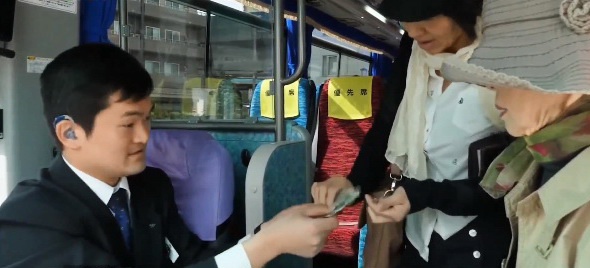Japan’s First Deaf Bus Driver
Takeyama Matsuyama dreamed of being a bus driver since he was young; he rode the bus during his youth and admired the drivers, thinking that “seemed very cool.”
As soon as Japan removed the ban on deaf drivers, Matsuyama went ahead and learned how to drive and passed the test.
Matsuyama wants to encourage other deaf Japanese citizens to keep applying for work and to not give up. He says he has future plans for a bus tour agency for deaf tourists that will be in Japanese Sign Language.
He reported that some of his co-workers have started learning Japanese Sign Language to be able to communicate with him.
Two Pivotal Law Changes
Removal of the Ban On Deaf Drivers
Driving laws in Japan used to ban all disabled drivers, including the deaf.
That changed in 2005 when advocates, along with Japan Federation of Deaf, rallied for the ban on deaf drivers to be lifted. They presented multiple proof of countries such as United States and France where deaf drivers are successful. The government looked into it and found the data to be strong enough to proceed with the ban repeal.
However, the law was replaced with a requirement for the deaf person to be able to hear at least 90 decibels with hearing devices. (Sirens and cars honking registered at 90 decibels.)
Then starting in 2011, all deaf drivers are allowed to drive after a bigger push from citizens to relax the law more. The only requirement now is to wear hearing aids while driving.

Work Discrimination Ban
Advocates successfully fought for a set of new laws banning workforce discrimination in 2013. In the years prior, Japanese society regularly discriminated against deaf who applied for work and made it an exhausting challenge for deaf Japanese citizens to find work.
The anti-discrimination laws under the titles “Act for Eliminating Discrimination Against Persons with Disabilities” and “Amended Act on Promotion for Disabled Persons’ Employment” went into effect in 2016. This allowed deaf drivers to obtain Class 2 license for operating passenger vehicles such as taxis and buses.

The laws helped encourage the Nihon Bus Association to hire Matsuyama along with his clean record and work ethic. Matsuyama obtained a driver’s license and worked as a delivery man for a small business for several years while keeping his driving record spotlessly clean. Two years later, he applied to be a bus driver and was hired.
More of Japan’s deaf citizens are becoming employed from the opportunities the amendments gave them.



